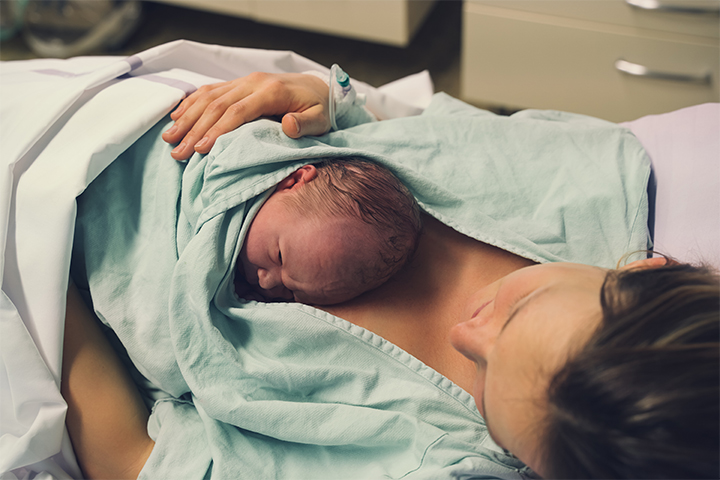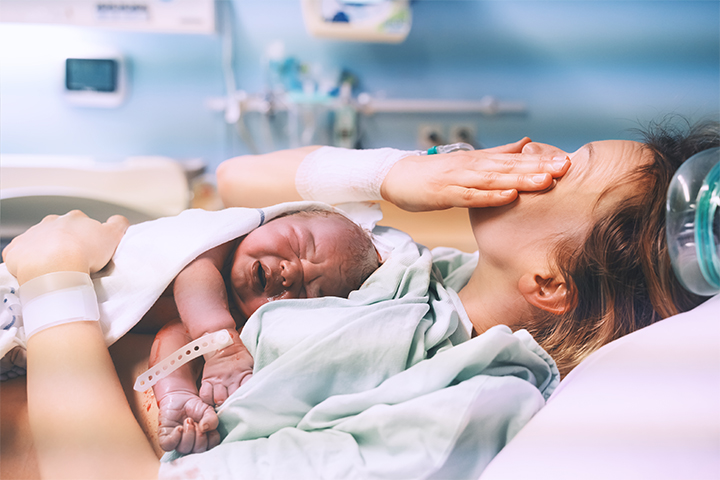
Image: Shutterstock
Welcoming a new life is an awe-inspiring experience, yet the aftermath of childbirth unveils a unique rollercoaster for both your body and mind. As you embrace the joy of your newborn, the focus inevitably shifts to a crucial chapter: recovery. This isn’t just about physical healing; it’s a holistic process requiring attention to both your body and mind. In this article, we’ll uncover why recovery takes time, highlight the different aspects of your well-being that need care, and provide guidance for a smoother postpartum journey. Read on to know more!
Why Does Recovery After Childbirth Take Time?
Image: Shutterstock
Childbirth, though a marvel in itself, is a profound physical feat. The process of labor and delivery triggers substantial changes in your body. It is akin to running a marathon. Picture this: after completing a grueling 26.2 miles, you wouldn’t expect to sprint back to your normal routine immediately. Similarly, your body, having endured the demanding task of ushering a new life into the world, requires a thoughtful period of recovery. The physiological transformations undergone during childbirth, ranging from the strain on muscles to potential tears or incisions, necessitate a convalescent phase. It’s a marathon of a different kind, and just as you wouldn’t rush through the aftermath of an intense race, your body deserves the time to mend and restore itself after the incredible journey of childbirth.
Physical Recovery
1. Healing From Tears Or Incisions
If you had a vaginal delivery, you might have experienced tears or needed an episiotomy. Cesarean section deliveries involve an abdominal incision. Both require time for proper healing.
2. Uterine Contractions
Image: Shutterstock
The uterus, which expanded significantly during pregnancy, undergoes contractions to return to its pre-pregnancy size. These contractions, also known as afterpains, can cause discomfort.
3. Hormonal Changes
Your hormones, which were on a ride during pregnancy, continue to fluctuate after childbirth. This hormonal dance can impact your mood and energy levels, contributing to the need for recovery.
Fatigue And Sleep Deprivation
1. Sleepless Nights
Taking care of a newborn often means disrupted sleep patterns. Lack of quality sleep can affect your physical and mental well-being, making recovery a gradual process.
Aspects Of Body And Mind That Need Attention
Image: Shutterstock
Physical Aspects
1. Pelvic Floor Exercises
Making your pelvic floor muscles strong is important for postpartum recovery. These exercises, like Kegels, can aid in healing and prevent issues like urinary incontinence.
2. Gentle Exercise
Gradually reintroduce light exercises to enhance blood circulation and promote overall well-being. Walking or postnatal yoga can be excellent choices.
Nutrition
Image: Shutterstock
1. Balanced Diet
Eating nutrient-rich foods is essential for replenishing your body after childbirth. Focus on a balanced diet with plenty of fruits, lean proteins, vegetables, and whole grains.
2. Hydration
Staying hydrated supports breastfeeding and aids in overall recovery. Water is your new best friend!
Mental Aspects
Image: Shutterstock
1. Emotional Well-being
The postpartum period is a mix of joy, exhaustion, and sometimes, anxiety. Prioritize your emotional well-being by expressing your feelings, seeking support from loved ones, or even considering professional help if needed.
2. Bonding With Baby
Building a strong connection with your newborn contributes positively to your mental health. Spend quality time with your baby, practice skin-to-skin contact, and embrace the joy of parenthood.
Ensuring A Smooth Recovery Process
Image: Shutterstock
Recovery is a journey best taken one step at a time. Here are practical tips to make the process smoother:
Accept Help
1. Delegate Tasks
It’s okay to lean on your support system. Let others handle household chores, cooking, and errands so you can focus on recovery and bonding with your baby.
2. Rest And Prioritize Sleep
Rest is essential for recovery. When your baby takes a nap, take advantage of the opportunity to catch some extra z’s yourself. The dishes can wait – your well-being cannot.
3. Communicate With Your Partner
If you have a partner, communicate openly about your needs and share responsibilities. Parenting is a team effort, and mutual support can make recovery more manageable.
Stay Connected
Image: Shutterstock
1. Get Connected With Other Mothers
Getting involved with a postpartum support group or connecting with other new moms can provide a sense of community. Sharing experiences and advice can be both comforting and empowering.
Listen To Your Body
1. Don’t Rush
Your body will signal when it’s ready for increased activity. Pay attention to these signals and avoid pushing yourself too hard too soon. Patience is key to a successful recovery.
Understanding the reasons behind the time recovery takes, addressing the specific needs of your body and mind, and adopting practical strategies for a smooth recovery can make this period more manageable and rewarding. Remember, you’re not alone – countless moms have been through this journey, and with the right support and self-care, you’ll emerge from the postpartum phase stronger and ready for the adventures of parenthood.



















